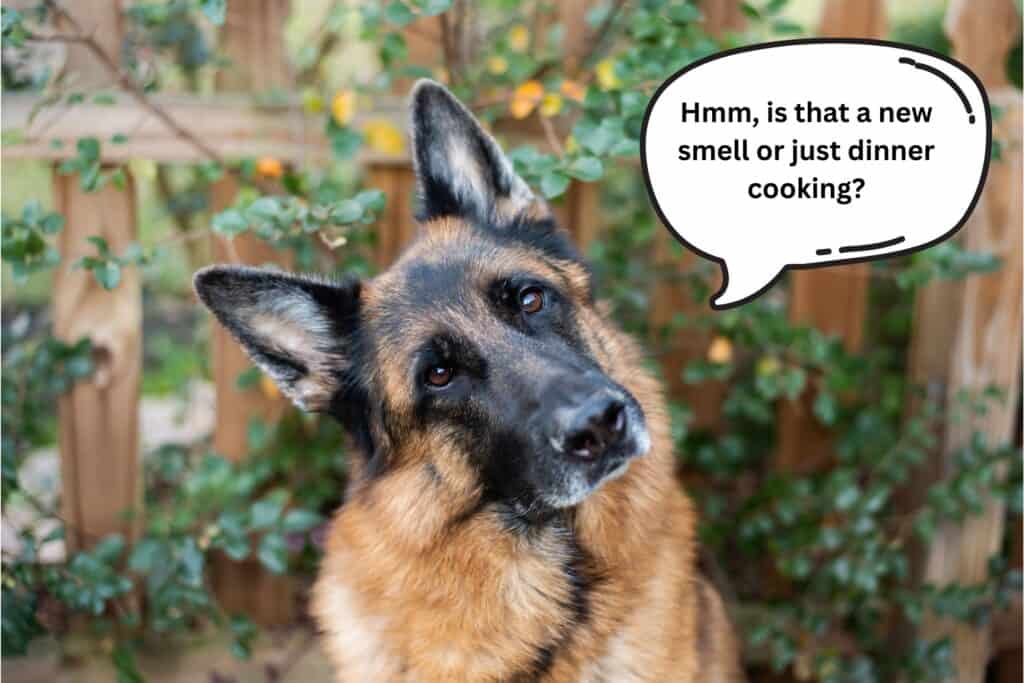We have ads and affiliate links sprinkled around like dog treats at a training session. As an Amazon Associate we earn from qualifying purchases. If you click and make a purchase, we earn a few kibbles to keep this dog park of a website running. So, thanks for tossing us a bone.
Ever asked yourself, ‘Why do German Shepherds whine so much?’ If so, you’re not alone.
This particular canine quirk is more than just a trait; it’s their own brand of doggy dialogue! Whining for these dogs is as natural as barking or wagging their tails – think of it as their version of texting.
Hang around a German Shepherd, and you’ll notice they’re quite the vocalists about their feelings. But why the extra whine? For German Shepherds, whining is like a Swiss Army knife for communication, useful for everything from seeking attention to reminding you it’s time for their walk.
Cracking the code of their whines might seem as complex as understanding ancient hieroglyphs, but fear not – we’re here to guide you through the melodious maze of your four-legged friend’s vocal expressions.

Decoding the Whine: Why Do German Shepherds Whine So Much and What They’re Really Saying
German Shepherds, with their high intelligence and keen senses, are deeply communicative animals. They often use whining as a way to signal their emotional state.
Are they feeling anxious, excited, hungry, or maybe just seeking some TLC? It’s their way of saying, “Hey, you, beloved human, I’m trying to tell you something important here!”
Additionally, German Shepherds may also whine when they’re in pain or discomfort. It’s their own method of alerting you that they may not be feeling 100%.
Tuning into these cues can help you understand your furry friend better and address any underlying issues they might be experiencing.
German Shepherds are bred to be working dogs, and this means they come with a built-in desire to be active and engaged.
Boredom? Not on their agenda. Lack of exercise or mental stimulation can lead to what could only be described as a whine-fest.
Behind the Whine: Unraveling the Mysteries of GSD Communication
Your pooch isn’t just being dramatic; they’re actually wired to love activity and purpose. Keep in mind that little yelp might just be their way of nudging you for more playtime or brain games.
Recognizing what’s behind that plaintive sound can help you provide the best care for your four-legged friend, ensuring that both you and your German Shepherd maintain a happy and harmonious life together.
Understanding Behavior to answer Why German Shepherds Whine so Much
Before diving into the vocal stylings of your German Shepherd, it’s crucial to understand that their whining is often a multifaceted form of communication, deeply rooted in their behavior.
Communication and Vocalization
German Shepherds are a vocal breed; they use their voices to express a wide array of emotions and desires. Since they can’t just tap you on the shoulder and ask for a treat, they resort to whining, barking, and sometimes even howling to make their needs known.
- Whining: Often linked to emotions such as excitement, anxiety, or even affection, your German Shepherd’s whine is much like a baby’s cry. Think of it as a canine way of saying, “Hey, pay attention to me!”
- Barking: More than just a loud shout-out, barking can indicate that your furry pal is feeling protective, is spotting something unfamiliar, or simply wants to join the neighbor’s dog for a bark-along.
- Howling: Less common but still significant, howling can be a nod to their wolf ancestors or a response to certain sounds. It could also be your dog’s version of group karaoke—belting out a tune with the pack.
It’s not just sounds; body language also plays a big role. Tail wags, ear positions, and body posture all accompany the sounds they make to give you the full picture.
Remember, your German Shepherd’s intelligence is through the (dog) roof. Coupled with their high-energy nature, this means they’re eager to communicate and may get a bit more creative—and vocal—about it.
And finally, German Shepherds are known for being fiercely affectionate and protective. They’re not afraid to wear their hearts on their furry sleeves, and if that translates to a bit more whining, then so be it. They just want to make sure you’re in the loop with their feelings and needs.
Why do German Shepherds Whine so Much? Breaking Down the Common Reasons
Ever wonder why your German Shepherd sounds like it’s trying to have a heart-to-heart with you through whines? Well, let’s get to the bottom of those soulful serenades.
Seeking Attention
German Shepherds may whine when they crave your undivided attention. It’s their way of saying, “Hey human, let’s interact!” They could be in the mood for a good cuddle, hoping for some affectionate time, or just engaging in some classic attention-seeking behavior.
- Attention: Just like a kid tugging at your sleeve for a treat.
- Cuddle: Picture those big eyes begging for a hug.
- Affectionate: They’re all heart, and they want yours too.
Desire for Exercise or Play
Your furry friend might also be telling you it’s time to get moving. A whine could mean “I’m bored, let’s go for a walk” or “I’ve got energy to burn, how about a game of fetch at the dog park?”. German Shepherds need plenty of physical exercise and mental stimulation to stay happy.
- Exercise Needs: They aren’t built for the couch potato life.
- Activities: Think running, jumping, and playing undercover detective in the bushes.
Expressing Emotional States
These dogs wear their hearts on their furry sleeves, whether it’s anxiety, excitement, fear, or joy. If your Shepherd is feeling anxious, like during a thunderstorm, or if they’re just plain excited about your return home, whining is their go-to way of expressing these emotions.
- Anxious: Like biting their nails, but with noise.
- Loneliness: Sometimes a whine is just a doggy version of “Miss You” by blink-182.
Indicating Discomfort or Pain
Lastly, if your normally stoic Shepherd is whining, it could be a sign of discomfort or pain. Keep your eyes out for any signs of discomfort such as limping, or symptoms of illness like vomiting. Whining can indicate they might be sick, injured, or dealing with a medical issue.
- Discomfort or Pain: If they were kids, they’d be flashing a sad face emoji.
- Medical Issue: More serious than their drama queen moments when the dinner’s late.
20 Translations of a German Shepherd’s Whine: What Your Furry Friend is Trying to Tell You
When your German Shepherd whines, it’s not just random noise; it’s a conversation! These intelligent dogs have a whole spectrum of emotions and needs they express through their distinctive whines.
Imagine if each whine were translated into human language – what would your German Shepherd be saying?

Here’s a fun and insightful list of 20 possible ‘translations’ of those heartfelt whines, helping you to understand your four-legged companion a little better.
- “Hey, I missed you! Where have you been all day?”
- “Is it walkies time yet? My paws are itching for a stroll.”
- “Dinner time, please! My stomach is practically singing.”
- “More belly rubs, please – you stopped too soon!”
- “That thunder is scary. Can I get some cuddles for comfort?”
- “I’m bored… How about a game of fetch or a puzzle?”
- “Something’s wrong – I don’t feel too good.”
- “Stranger alert! Someone’s at the door!”
- “I need a potty break, like, now!”
- “That spot on the couch looks so comfy. Mind if I join you?”
- “I found something interesting! Come see!”
- “I’m feeling anxious. A little reassurance would be nice.”
- “Playtime, please! Fetch that ball, will you?”
- “I think it’s time for my grooming session, don’t you?”
- “Is that a new pet? I’m not sure how I feel about this…”
- “You’re leaving again? Can I come too?”
- “I’ve got so much energy! Let’s do something active!”
- “This new food… not sure if I like it.”
- “I heard a weird noise. Going to stand guard, just in case.”
- “It’s our snuggle time – I’m waiting!”
Talking Back to the Whines: Understanding and Responding to ‘Why Do German Shepherds Whine So Much’
When your German Shepherd turns into a whine connoisseur, it’s crucial to understand the fine art of response. Let’s tune into the frequency of your pooch and turn down the volume on that whining.
Training and Positive Reinforcement
If your German Shepherd’s whining was music, you’d probably never hit play. Good thing is, you can remix this behavior with training and positive reinforcement.
Start with identifying the triggers of the behavior. Once you pinpoint what causes your furry friend to hit the high notes, you can begin to address it.
To reduce whining, start with basic commands such as ‘quiet’, paired with a treat when your dog complies. You’re essentially DJing their behavior, cueing them when to drop the beat, or in this case, the whine.
Remember, consistency is your best friend here—mix it up too much, and you’ll have a confused pup.
Providing Adequate Stimulation

Sometimes, your German Shepherd whines not to drop the next big hit but simply because they’re bored. Think of them like an athlete without a playground. You gotta provide them with the right toys, activities, and mental stimulation.
Keep their mind and body busy, and you may just find that the whines turn into contented sighs.
Offer daily physical stimulation through a structured routine of regular exercise; think of it as their daily gym session.
Combine this with activities that challenge them mentally, like puzzle toys or obedience games. Your dog’s brain craves a workout just as much as their muscles do.
Handling Healthcare Needs
If your German Shepherd is crooning more than usual, it may be time for a check-up with the vet. Whining could be their way of telling you they’re not feeling top-notch.
Regular care and health screenings can help ensure any hidden issues are addressed before they become chart-toppers.
Schedule routine visits to the veterinarian to rule out or treat any undisclosed ailments. Think of it like taking your car in for a service; it’s about keeping everything running smoothly so your furry pal doesn’t have to ‘sing’ about something being wrong.
Improving the Environment and Lifestyle

To curb your German Shepherd’s vocal Olympics, tweaking their environment and routine can work wonders.
Creating a Stress-Free Living Space
Your German Shepherd might be whining because they feel like their den is more of a dragon’s lair than a cozy retreat. Make their space safe and inviting by ensuring it’s quiet and comfy—no piles of clutter for them to navigate or noisy appliances to startle them.
A dedicated spot with their favorite blanket and toys can help them feel secure and less stressed.
- Noise Levels: Keep it down! Too much noise can make your pooch feel like they’re living in a pinball machine.
- Comfort Items: A familiar blanket or a chew toy can be like a security blanket for your furry friend.
Establishing a Routine and Boundaries
Dogs, especially German Shepherds, flourish with a well-defined schedule and clear boundaries. By setting consistent times for their daily activities, you help your furry friend feel secure and less prone to anxiety-induced whining.
Routine Essentials:
- Meal Times: Regular feeding times provide structure and prevent hunger whines.
- Walk Schedule: Daily walks at the same time help manage their energy and maintain a calm demeanor.
- Training Sessions: Regular training reinforces boundaries and builds confidence.
- Quiet Time: Designate a specific time for calm and rest, reducing stress-related whining.
- Play Sessions: Scheduled play keeps them entertained and looking forward to fun times.
Socialization and Companionship
A German Shepherd’s social needs are akin to having a busy social calendar. They crave interaction and companionship, and meeting these needs can significantly reduce feelings of isolation and the resulting whining.
Socialization Strategies:
- Regular Playdates: Regular interactions with other dogs can fulfill their social needs.
- Companion Pets: Another pet in the house can provide constant company and reduce loneliness.
- Doggy Daycare: Occasional visits to a doggy daycare for socializing and fun.
- Interactive Toys: Toys that engage them mentally can be a substitute for social interaction.
- Family Time: Ensure they get ample family interaction, making them feel part of the pack.
Frequently Asked Questions about Why Do German Shepherds Whine so Much
If your German Shepherd has been tuning up their vocal cords more than usual, you’re probably wondering about the whys and the hows.
Here’s a breakdown of the most common questions owners have about their melodious pups.
What might cause a German Shepherd to whine excessively in various situations?
In various situations, your German Shepherd might whine for attention, express anxiety, show excitement, or indicate they need something, like a bathroom break. Sometimes, they’re just having a chatty day and decide to tell you all about it.
How can owners address and manage their German Shepherd puppy’s frequent whining?
When your little furball starts their whining symphony, ensure they’re well-fed, exercised, and comforted. Consistency is key in training—ignore the whining when it’s attention-seeking, but always check for genuine needs.
In what ways can German Shepherd owners interpret the different whines and sounds their dogs make?
Pay attention to the pitch, duration, and context of the whining to decode your German Shepherd’s message. A high-pitched, brief whine might be excitement, whereas a long, low whine could suggest discomfort.
What are the best techniques to discourage a German Shepherd from whining, especially during nighttime?
To keep nighttime serenades at bay, establish a comforting evening routine and a cozy sleeping area. If your dog is well-exercised and has a consistent schedule, they’ll be more likely to snooze through the night.
Could whining be indicative of health issues in German Shepherds, and how can it be addressed?
Yes, whining can signal health concerns. If your German Shepherd’s whining is accompanied by changes in behavior or appetite, a vet visit is in order. They may be trying to tell you something’s off with their health.
What are the reasons behind a German Shepherd’s highly vocal behavior, and how does it differ from other breeds?
German Shepherds are a talkative bunch partly because of their intelligence and eagerness to communicate with their humans. Their vocal range can be richer than other breeds, making them seem more expressive (or opinionated).
Why Do German Shepherds Whine So Much – Final Thoughts
In summary, the key to addressing ‘Why do German Shepherds whine so much’ lies in recognizing and responding to their needs. Establishing a consistent routine and setting clear boundaries create a sense of security and predictability for your Shepherd.
Meanwhile, ensuring adequate socialization and companionship addresses their emotional and mental well-being.
By attending to these aspects, you not only reduce unnecessary whining but also strengthen the bond between you and your furry friend, paving the way for a harmonious and joyful life together.
